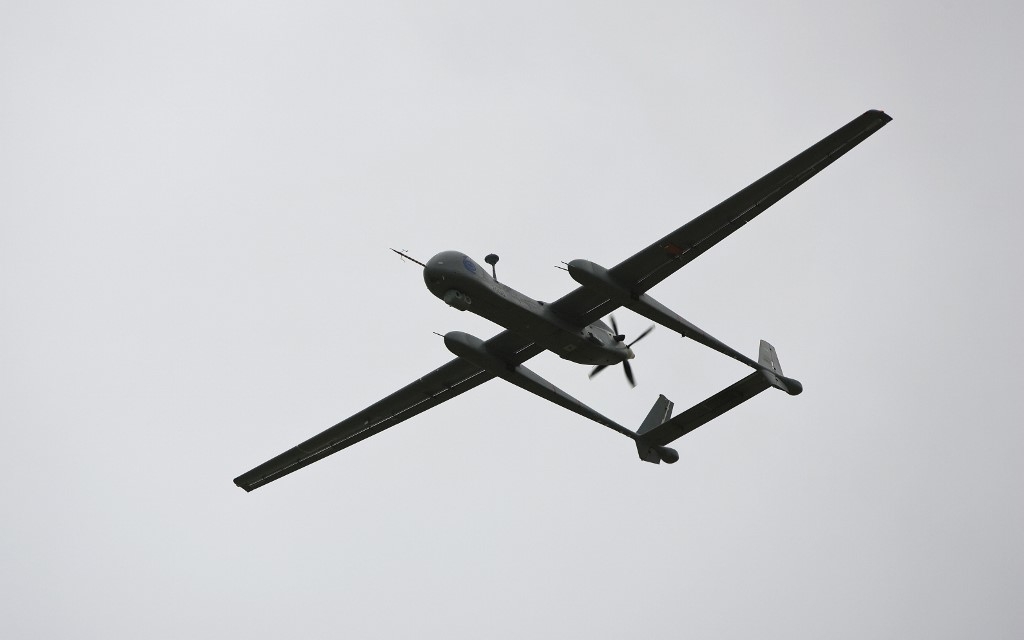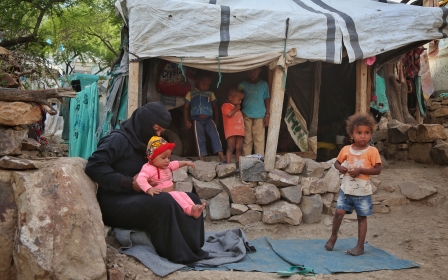Arabic press review: UAE supplies Haftar with Israeli drones

The UAE supplies Haftar with Israeli weapons
Libyan sources have revealed that an Emirati military cargo plane carrying large quantities of military equipment landed at the al-Jufra military base last week, according to the London-based Al-Araby Al-Jadeed newspaper.
Al-Jufra, which is located in the centre of Libya, is controlled by fighters associated with the Russian Wagner company.
The sources said the UAE had recently supplied militias aligned with eastern military commander Khalifa Haftar with five armed drones.
They also revealed that Abu Dhabi had recently provided the militias, in complete secrecy, with three Israeli-made “Heron” model drones, which have great potential as they can carry large quantities of explosives.
New MEE newsletter: Jerusalem Dispatch
Sign up to get the latest insights and analysis on Israel-Palestine, alongside Turkey Unpacked and other MEE newsletters
The Heron TP2 drone, known as Eitan, is used by the Israeli army in its operations.
It can carry a large quantity of weapons and communication systems, can be equipped with air-to-surface missiles and guided bombs, and it can fly for 30 hours at a speed exceeding 400 kilometres per hour.
Abu Dhabi also provided Haftar's forces with two CH5 aircraft, which are produced by the China Aerospace Science and Technology Corporation and can carry out combat missions as well as reconnaissance and intelligence operations, according to the sources.
Saudi Arabia backs UAE allies in southern Yemen
A Yemeni government source has disclosed that Saudi Arabia is working with Yemeni leaders in the south to enable United Arab Emirates allies to maintain their control over state institutions, according to Arabi21.
The official source, who spoke on condition of anonymity, said that the kingdom’s ambassador to Yemen, Muhammad al-Jaber, held a meeting with the advisers of Yemeni President Abd Rabbuh Mansour Hadi, members of the presidential committee of the Council of Representatives from southern governorates and the leaders in the Southern Transitional Council (STC), backed by the UAE, to discuss forming the next government.
The source said Jaber suggested that leaders from the UAE-backed southern factions should be included in the next government.
The source said the Saudi ambassador was playing a “very suspicious and dangerous” role.
“At a time when President Hadi is seeing local support for his legitimate authority and dissatisfaction with the transitional rule, [the ambassador] in turn stays in closed rooms and sponsors suspicious discussions to widen the gap of divisions in Yemen,” the source added according to Arabi21.
Algerian journalist imprisoned for three years
A court in Algeria has sentenced journalist Abdel-Sami Abdel-Hay to three years in prison in a case that has haunted him for seven years, reported the London-based Al-Quds Al-Arabi newspaper.
In 2013 Abdel-Hay was arrested for facilitating the escape of journalist Hisham Abboud, who was banned from travelling, for publishing a report on the health status of former Algerian President Abdelaziz Bouteflika.
Abdel-Hay had been subjected to temporary imprisonment without trial for two years on the orders of Said Bouteflika, brother of the ousted president, who is currently imprisoned, according to the newspaper.
The new ruling came as a shock despite the fact that the prosecution requested 20 years in prison for the journalist in the appeal trial, a petition similar to what is being sought for senior officials and regime figures known to be corrupt during Bouteflika's rule, according to the newspaper.
Bahrain imposes $160 coronavirus tests for travellers
All passengers arriving at Bahrain International Airport are required to take two Covid-19 tests at their own expense, amounting to $160, according to Alkhaleej Online.
The Bahraini Ministry of Health announced that starting on Tuesday all passengers would undergo a coronavirus test upon arrival at the airport, at a cost of 30 Bahraini dinars ($80).
The ministry also stated that all travellers would need precautionary quarantine for a period of 10 days at the end of which they would need to undergo another Covid-19 test, costing another 30 Bahraini dinars ($80).
Arrivals must also download and register on the "Bahrain bh" app, a government application, on their smartphones.
* Arabic press review is a digest of reports that are not independently verified as accurate by Middle East Eye.
Middle East Eye delivers independent and unrivalled coverage and analysis of the Middle East, North Africa and beyond. To learn more about republishing this content and the associated fees, please fill out this form. More about MEE can be found here.




